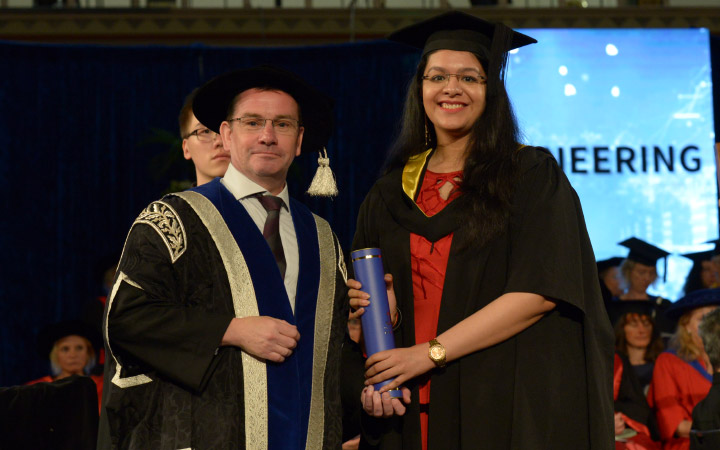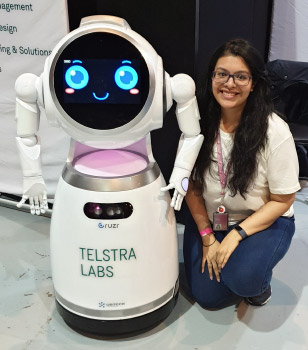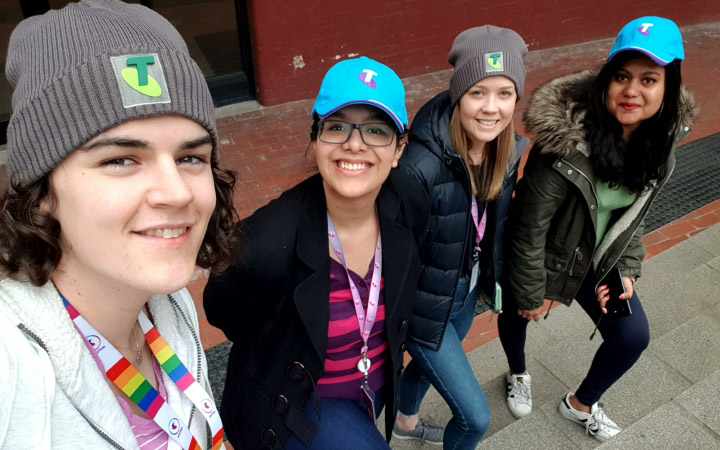Akansha Pandey: building a career in cybersecurity
An opportunity to combine computer science with technical business expertise inspired Akansha Pandey to move from India to Australia to undertake a Master of Information Systems. Akansha shares her story about her budding career in cybersecurity.
What interested you in pursuing a Master of Information Systems?
I’ve been coding since high school and have always loved it, so it seemed a natural choice for me to pursue computer science engineering. And as I started my first job at IBM, I saw a gap between the technical and business teams and wanted to bridge it. I looked for degrees that could help me achieve this and provide me the opportunity to explore other fields, like cybersecurity. The Master of Information Systems at Melbourne ticked all my boxes and I came to Australia to pursue it.

You’re now working in cybersecurity, what led you to pursue a career in this area?
One of my professors in my undergraduate degree encouraged us to think about the security implications of whatever we were coding for our projects. Security always fascinated me so I did my major project in cloud security, which opened my eyes to cryptography and encryption. However, I didn’t think of building a career in cybersecurity until I started my masters at the University of Melbourne. It was in my first semester when one of my professors who had worked in cybersecurity shared his experiences in class and that led me to explore it as a career path.
During my masters, I took subjects on cybersecurity to gain knowledge in this space. The assignments were industry-based projects which gave me confidence to apply my knowledge to real-world problems. I also attended industry events which gave me an opportunity to interact with cybersecurity professionals and hear about their experiences and challenges. This knowledge not only helped me crack my job interview but also helped me transition into my new role.
Can you tell us about your career to date, and a bit about your current role?

I started at Telstra as a Summer Vacationer after applying for an internship in the first semester of my masters. As an international student, it helped me gain valuable experience in an Australian workplace and gave me a feel for the dynamics in a big organisation. I understood the importance of policies and systems for better communication and learnt the importance of teamwork and collaboration between business units to achieve a common goal.
I am currently working at Telstra as a Security Technologist in Cyber Security Risk & Governance. I’ve had the opportunity to work in the areas of cybersecurity risk and governance, AI ethics, developed machine learning models for a COVID-19 related project, lead a project to test fairness of an AI system and worked on a 5G project with a group of women in my company.
I always keep an open mind and say yes to opportunities even if they are out of my comfort zone because even if I don’t know something, I will explore and gain the necessary skills to get the desired outcomes.
What are some of the current trends in cybersecurity?
Cybersecurity is a huge topic with trends spreading across industries. In recent times with more staff working remotely than ever, organisations have had increased security risks. Employees are often considered the weakest link in security, so companies are investing in end-to-end protection measures and cyber awareness for employees to protect them against social engineered attacks eg: phishing and deep fake technology.
As emerging technologies are entering organisations, they are also opening doors for new security risks. The major challenge is that organisations want to use new technologies, however, their architecture may not be secure enough. There has been an increase in number of attacks using AI and against AI, for example, injecting bad data into AI programs. However, organisations are investing in AI to better their detection capabilities.
Lastly, data loss prevention is a major growth area as ransomware attacks are on the rise. There has also been a focus on data privacy & regulations by governments around the world.
Cybersecurity provides a sea of opportunities for anyone interested to build a career in this field, both from a technical or non-technical background.
Going back to your studies, how did you find your time at the University of Melbourne?
I had such a wonderful time at the University of Melbourne and made so many memories throughout my two years. The University has a very strong sense of community with lots of student clubs to get involved in and meet like-minded people, from tea club to cybersecurity and a cheese-lovers group. Every culture is respected and celebrated which gives people an opportunity to express themselves and their culture through food, dance or clothes.
I was secretary at the Women in Technology club and industry liaison for the Computing and Information Systems Students Association. Being part of these societies was an enriching experience which allowed me to follow my passion of empowering women in STEM and meeting incredible people along the way.
What advice would you give undergraduate students looking to study Information Systems Engineering?
You’ll be learning the necessary theoretical knowledge, so try to gain practical experience in a field that interests you through volunteering or an internship and talking to people who work in that area. This will help you gain more knowledge about that field and might also open opportunities for you.
Keep an open mind and say yes to any opportunity that presents in front of you even if it means stepping out of your comfort zone, and don’t be afraid to make mistakes. These mistakes are equally as important as your studies as they help you discover the career path that you want.
Most importantly, enjoy your university experience and take advantage of everything on offer to you as these university days are precious!
